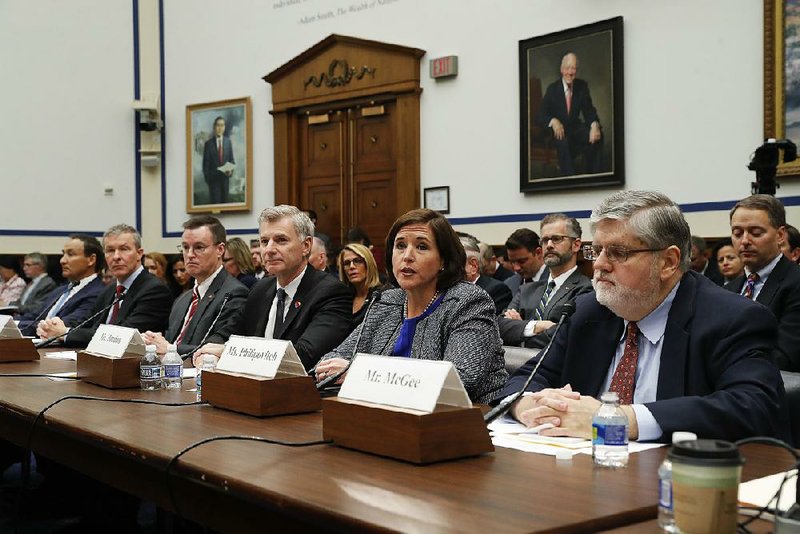Lawmakers lambasted executives from United Airlines and other carriers Tuesday as the first of two congressional hearings began into the high-profile incident of police dragging a man off a flight last month.
"The reason I'm sitting here now is because on April 9 we had a serious breach of public trust," Oscar Munoz, chief executive officer of United Continental Holdings Inc., told members of the House Transportation and Infrastructure Committee.
Munoz repeated apologies for the incident and said the airline has made many policy changes such as increasing compensation for people who have to give up their seats.
"Something is broken," Rep. Bill Shuster, the chairman of the committee, said at the opening the hearing. If airlines don't make changes, it will prompt congressional action and, "I can assure you, you will not like the outcome."
Shuster, R-Pa., praised the four carriers that agreed to testify, calling them the "brave few." All major carriers were invited, he said. While United, American Airlines, Southwest Airlines and Alaska Airlines officials were there, Delta Air Lines didn't send a representative.
The issue of airline relations with customers developed after a passenger was dragged off a United flight in Chicago. The airline needed additional seats to make room for crew members who needed to get to Louisville, Ky., to operate flights the next day, so it bumped the passenger. When he declined to leave his seat on the plane, police removed him by force.
Videos of the incident taken by passengers were spread by social media sites and included on television news broadcasts.
As a result, airlines are racing to alter policies for passengers bumped from flights as consumer groups demand changes in the law. Congress on Tuesday opened the first of two hearings prompted by the United incident.
The uproar comes as the Department of Transportation under President Donald Trump has taken preliminary steps to slow or undo consumer-protection rules sought by former President Barack Obama. In March, the administration said it was suspending an effort to draft a regulation requiring more disclosure of airline fees.
"What happened on United Express flight 3411 cannot happen again," Rep. Rick Larsen, a Washington Democrat who is his party's senior member on the committee's aviation subcommittee, said. "But, in truth, these problems are not specific to United Airlines."
Flying in the United States has become a "terrible" experience, from the time someone logs in on a computer to try to figure out which carrier has the lowest fares, said Rep. Mike Capuano, a Massachusetts Democrat. While Capuano told Munoz he accepted the apologies, he said that is just the "beginning."
"I hope you all know that this doesn't stop today and you will be judged on how it is implemented," Capuano said.
One of the most contentious issues facing the aviation industry -- whether to shift control of the government's air-traffic service to a nonprofit corporation -- crept into the discussion. Rep. Dina Titus, D-Nev., questioned whether airlines, which would have seats on the board of a new corporation running the system, would serve the public.
"What guarantee does the customer have you'll do any better job at that than you're doing now with just getting them on the plane or dragging them off?" Titus said.
United President Scott Kirby said most airlines supported the move because it would make flights more efficient.
Trump supports Shuster's proposal to shift control of air traffic from the Federal Aviation Administration to a nonprofit. Shuster has said he would like to push that measure later this year.
While it was United's policy to use police to remove bumped passengers who wouldn't leave their seats, Munoz said under questioning that he wasn't aware of any similar cases. Police are normally called only when a passenger is a security risk or disruptive, he said.
Most cases of bumping passengers at United occur because of operational issues -- such as weight restrictions that require leaving some seats empty -- instead of overbooking, said Kirby.
American Airlines is more closely monitoring oversold flights and has promised not to remove anyone after a plane has already been boarded, said Kerry Philipovitch, senior vice president for customer experience.
"While we strive for perfect customer service every day, the reality is the system is far from perfect," Philipovitch said. "Nonetheless, when these customer service issues occur, we work quickly to fix and learn from them."
The United passenger, David Dao, 69, reached an undisclosed settlement with the airline on Thursday, ending legal action against the carrier related to the April 9 incident.
A physician from the Louisville area, Dao suffered a concussion, fractured nose and two broken teeth as police removed him from his seat.
Information for this article was contributed by Mary Schlangenstein and Michael Sasso of Bloomberg News.
Business on 05/03/2017

